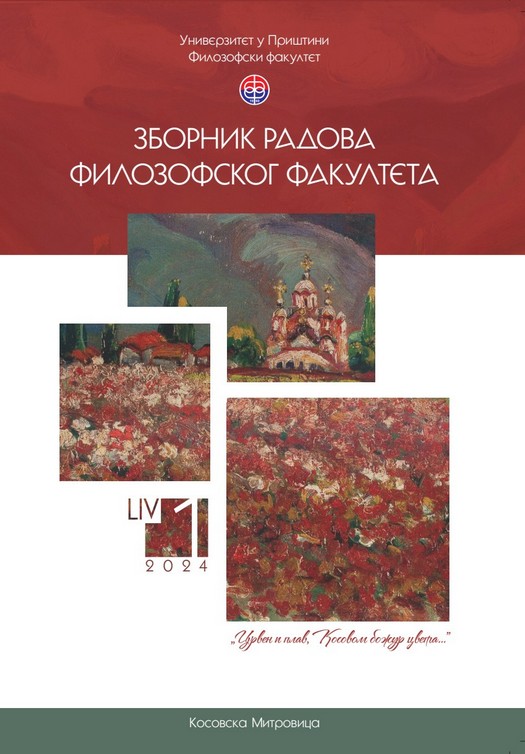Frequency of Anglicisms in Vebal Associations of English Language Students
Abstract
The paper deals with the research on the prevalence of recent anglicisms in the everyday language of the students at the Department of English Language and Literature of the Faculty of Philosophy in Kosovska Mitrovica. Since the anglicisms that have entered the Serbian language in the last two decades are the result of progress in information and computer technology, the goal of this research is to assess the most common English-origin vocabulary, especially in the speech of older adolescents. Although the sample was a group of English language students (N=50), it is assumed that their everyday language reflects the language of the wider population of students of English language and literature, which should be examined by including a much larger number of English speakers from different universities in Serbia, in order to reach more reliable results. One of the tasks of the linguists is to preserve the Serbian language from the influx of foreign words, while the role of lexicographers is to publish new dictionaries including all foreign words that enter the Serbian language and persist there. New words of English origin multiply every day in contact with content found on the Internet, starting from social networks, blogs that offer advice for various problems, sites that are full of lexical units originating from the English language, films, series, and so-called “tutorials” that are especially followed by the younger population. This paper will not discuss the justification of the use of anglicisms found, but an attempt will be made to find those that are most frequent, and thus the lexicon that, whether we like it or not, entered the Serbian language. The study relies on the free verbal association method to identify frequent lexical units originating from English. Comparative analysis is performed using the latest dictionaries Речник нових речи у српском језику 1 (Оташевић и др. 2022), abbreviated as RNR, and Srpski rečnik novijih anglicizama (Prćić et al. 2021), abbreviated as SRNA. Consequently, the paper highlights the most frequent lexical units from the students’ perspective that are not listed in the dictionaries RNR (2022) and SRNA (2021). Through free verbal associations, students wrote anglicisms they use in their speech. The diversity in the choice of alphabets, as well as forms that the students chose while writing anglicisms, would be determined. This research, although it has shortcomings in terms of the small number of respondents, can still provide valid data in the field of lexicography and contact linguistics.
References
Бугарски, Р. (2005). Језик и култура. Београд: Чигоја штампа – XX век.
Драгићевић, Р. (2010). Вербалне асоцијације кроз српски језик и културу. Београд: Друштво за српски језик и књижевност Србије.
Дражић, Ј. (2022). Приступи проучавању значења речи. Нови Сад: Филозофски факултет.
Оташевић, Ђ., Николић, М. и Ђорђевић, В. (2022). Речник нових речи у српском језику 1. Београд: Институт за српски језик САНУ.
Crystal, D. (2004). Language and the Internet. Cambridge: Cambridge University Press.
Dimitrijević-Savić, J. (2009). Međugeneracijske razlike i očuvanje srpskog jezika u Australiji. U: M. Kovačević (ur.), Jezički sistem i upotreba jezika (str. 341–350). Kragujevac: FILUM.
Filipović, R. (1986). Teorija jezika u kontaktu. Uvod u lingvistiku jezičnih dodira. Zagreb: Školska knjiga.
Herrell, A. (2000). Fifty Strategies in Language Teaching. Upper Saddle River, NJ: Prentice Hall Inc.
Kovačević-Filipović, S. (2011). Anglicizmi kao međujezički pojmovni amalgami. Зборник Матице српске за филологију и лингвистику, LIV (2), 247–763.
Krashen, S. (1987). Principles and Practice in Second Language Acquisition. Hertfordshire: Prentice-Hall International.
Kulić, D. (2019). Dramske tehnike u nastavi stranog jezika. Kosovska Mitrovica: Filozofski fakultet.
Lightbown, P., & Spada, N. (1993). How Languages are Learned. Oxford: Oxford University Press.
Mišić-Ilić, B. i Lopičić, V. (2011). Pragmatički anglicizmi u srpskom jeziku. Зборник Матице српске за филологију и лингвистику, 54, 261–273.
Niketić, P. (2020). Conceptual blending in English and Serbian questiоn-and-answer jokes: Cultural transfer issues. European Journal of Humour Research, 7(4), 106–124.
Panić Kavgić, O. (2022). Koliko razumemo nove anglicizme. Novi Sad: Filozofski fakultet.
Prćić, T. (1997). Semantika i pragmatika reči. Sremski Karlovci – Novi Sad: Izdavačka knjižarnica Zorana Stojanovića.
Prćić, T. (2011). Engleski u srpskom. Novi Sad: Filozofski fakultet.
Prćić, T., Dražić, J., Milić, M., Ajdžanović, M., Filipović Kovačević, S., Panić Kavgić, O. i Stepanov, S. (2021). Srpski rečnik novijih anglicizama. Novi Sad: Filozofski fakultet.
Sapir, E. (1921). Language: An Introduction to the Study of Speech. New York: Harcourt, Brace.
Skliarenko, O. (2022). Associative experiment as modern mean of linguistics studies. Věda a perspektivy, 10(17), 68–78. https://doi.org/10.52058/2695-1592-2022-10(17)-68-78
Vasić, V., Prćić, T. i Nejgebauer, G. (2001). Du ju speak anglosrpski? Rečnik novijih anglicizama. Novi Sad: Zmaj.
The details about the publication policy, including copyright and licensing, are available at:

